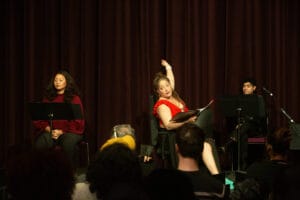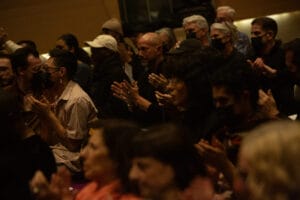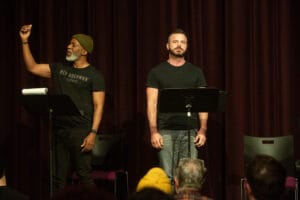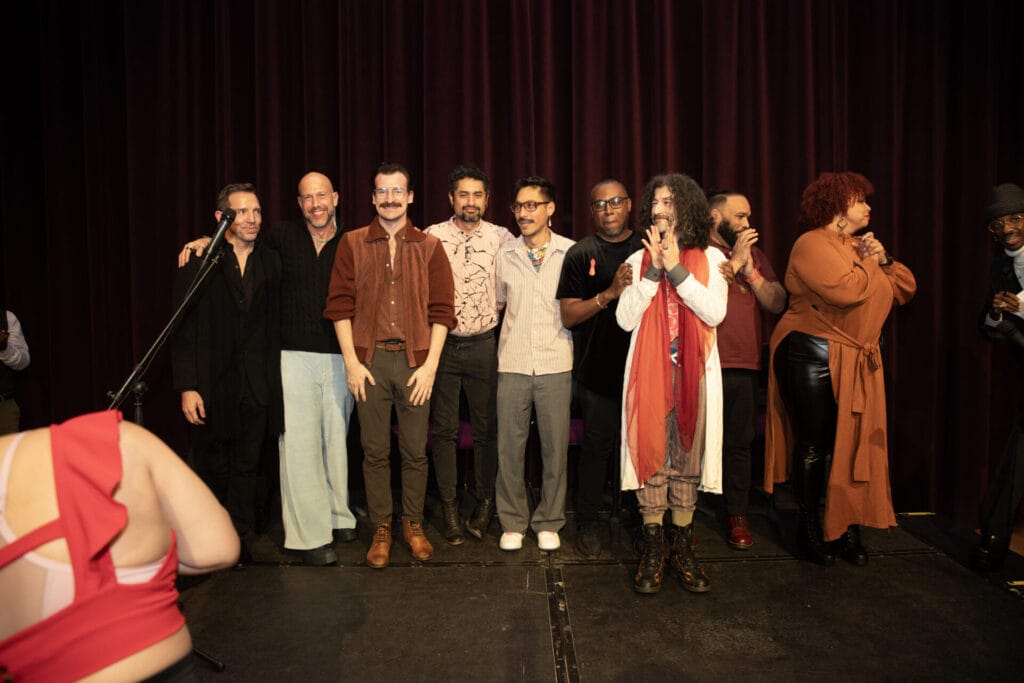This December 2nd, 2024, Write It Out! (WIO!), a groundbreaking program founded by Afro-Queer playwright and HIV advocate Donja R. Love, captivated audiences at The Center in New York City with a powerful staged reading of ten-minute plays written by its 2024 cohort. Held in honor of World AIDS Day, the event showcased the transformative power of storytelling and underscored the urgent need to combat HIV stigma through art and representation.
The event’s themes resonate deeply with the findings of GLAAD’s 2024 State of HIV Stigma Report. Now in its fifth year, the report offers a sobering yet vital look at the progress made in combating HIV stigma, as well as the work that remains:
- Public belief that stigma around HIV still exists has decreased from 89% in 2020 to 85% in 2024, signaling gradual progress.
- However, there has been a concerning decline in the belief that people living with HIV can lead long, healthy lives (from 90% in 2020 to 85% in 2024), with the Southern U.S. seeing the most significant drop.
- Representation of people living with HIV in entertainment media is dwindling, with only one LGBTQ character living with HIV portrayed on primetime scripted television last season, a character not slated to return.
These findings, particularly the loss of representation in media, underscore the importance of initiatives like Write It Out!, which amplify stories of people living with HIV and bridge generational and cultural gaps in understanding.
Honoring Journeys and Confidentiality
Write It Out! honors the journey and confidentiality of each participant. The program provides a safe and inclusive space for participants to express their experiences authentically. The 2024 cohort featured in this article consented to share their images in relation to WIO!, celebrating their creativity and courage on this public stage.
The Power of Storytelling
Write It Out! was born out of Donja R. Love’s personal journey of reckoning with their HIV diagnosis, a process they describe as deeply painful but ultimately healing. Recognizing the therapeutic potential of storytelling, Love created the program to help others navigate their own journeys with HIV. Through writing workshops and community support, WIO! fosters an environment of inclusion and self-expression, empowering participants to confront societal shame and reclaim their narratives.
During Monday’s event, the audience witnessed firsthand the transformative power of this initiative. The ten-minute plays—each brimming with vulnerability and unfiltered truth—touched on themes ranging from love and loss to resilience and joy. These stories humanized the HIV experience, breaking down barriers of stigma and prejudice.

A Critical Moment for Representation
GLAAD’s report highlights a significant loss of visibility for people living with HIV in media, with year-over-year declines in portrayals on television and in movies. This trend is alarming given that representation plays a crucial role in breaking down stigma. When audiences see authentic depictions of people living with HIV, their comfortability in engaging with those individuals increases by as much as 15%, according to the report.
Donja R. Love addressed this gap head-on through WIO!, creating a space where participants—63% of whom identify as people of the global majority and 45% as women, trans, or nonbinary—can develop their artistic voices and share their truths. These stories don’t just provide catharsis for the playwrights; they challenge audiences to rethink their perceptions of HIV and those living with it. As one 2023 alum poignantly shared, WIO! provided “a community, a place to belong, a place void of isolation and shame.” For many participants, the program is life-changing, offering a sense of connection, healing, and empowerment.

Looking Forward
As the evening concluded, the audience at The Center left with a renewed sense of urgency to advocate for change—both onstage and off. The combination of WIO!’s powerful storytelling and GLAAD’s ongoing work to track and combat stigma underscores the need for a sustained, multi-faceted approach to ending HIV stigma.
With the support of organizations like ViiV Healthcare, GLAAD, and Broadway Cares/Equity Fights AIDS, Write It Out! continues to grow, fostering new voices and reshaping the cultural conversation around HIV. As Donja R. Love eloquently puts it, “We are more than our trauma; we are worthy and whole.”
In a world where representation is both scarce and essential, programs like WIO! remind us that every story told is a step toward a future free of stigma, full of understanding, and grounded in dignity and humanity.
Exclusive Interview
Check out the interview below with Afro-Queer playwright and HIV advocate Donja R. Love, where they share their insights on the transformative power of storytelling, the founding of Write It Out!, and the ongoing fight against HIV stigma!

GLAAD: Write It Out! provides a platform for participants to share their stories and combat stigma through creative expression. With GLAAD’s report showing a troubling decline in public belief that people living with HIV can lead long, healthy lives, how do you see initiatives like WIO! contributing to shifting these perceptions and driving a more accurate understanding of living with HIV?
Donja: At the center of Write It Out! is community. We provide space for people living with HIV of all identities and experiences to connect. These connections – this community – empower people living with HIV to navigate through their shame and combat stigma to live more authentically in a way they feel safe and seen. The shift starts with people seeing themselves reflected and knowing that their stories matter – they matter. When people know they matter, there is a fullness to one’s existence and the space they hold for themselves. It’s a “Hey! I’m here!” Through art and community, WIO! cultivates and encourages that fullness of life. We know that the best way we can shift these perceptions is by living. We want our community to live!

GLAAD: The report highlights a persistent lack of HIV knowledge among Gen Z, with only 37% of adults in this group feeling informed. How can storytelling, particularly in the arts and media, be leveraged to bridge this generational knowledge gap and engage younger audiences in conversations about HIV?
Donja: Art is healing. Visibility is survival, as Joseph Beam once wrote. Art creates visibility, and visibility creates art. It’s a beautiful cycle that creates space for people to be in conversation, learn, and grow. There is a lack of visibility of Poz people in art and media. There is also a lack in the kinds of storys we are told about HIV. The majority of stories are rooted in the past. But what about the stories of now? How can we meet those in Gen Z (and others) who are ignorant of the history and facts about HIV? The answers to these questions can be found in having people living with HIV tell stories about HIV that aren’t just highlighting the crises but also the celebrations. Storytelling must meet this moment in history and community to heal, survive, learn, and grow.

GLAAD: GLAAD’s study reveals a significant decrease in the portrayal of LGBTQ characters living with HIV on television, which is a missed opportunity to normalize and humanize these experiences. How important is it for Hollywood and other media platforms to step up their representation of people living with HIV, and how can programs like WIO! inspire or inform these portrayals?
Donja: The answer is in the question—representation of people living with HIV. So often, the narrative we get is of people dying of AIDS. As we’ve made advancements in medicine and science, Hollywood and society don’t see stories about HIV or AIDS as necessary. They only think of the dying, not the living, the laughing, the loving. This is also because people living with HIV aren’t telling our stories – or there aren’t more of us in the rooms – pitching ideas, running shows, leading studios, etc. Having community in these positions can change that. WIO! is providing the community with tools to tell their stories with craft and care, with connections to these spaces, and with the understanding that we are more than enough. Representation is not liberation. However, representation rooted in authenticity and care is a step in the right direction. WIO! is building a community that will lead us in that direction.
As we continue to combat HIV stigma in society, programs like Write It Out! remind us that representation matters—not only on stage or screen but in the everyday spaces where understanding and compassion are cultivated.
Whether as an audience member, advocate, or ally, we all have a role to play in fostering a world where every voice is valued, and every story is told.
For more information on Write It Out! or to support its mission, visit: www.letswriteitout.com & learn more about Donja’s activism work at www.theeachotherproject.com.













